I don’t like using the term superfood, though it could certainly be applied to Spirulina (and is sometimes used for coconut oil). Surprisingly, you may know this amazing compound by its common name…
Pond scum:
This nutrient rich substance is actually a cyanobacteria and it boasts its fair share of health promoting properties. It is rich in chlorophyll, and like plants, gets its energy from the sun. It does have many benefits, (though contrary to some health claims, I’ve seen no evidence that it cures cancer or HIV).
What is Spirulina?
Spirulina is a natural “algae” (cyanbacteria) powder that is incredibly high in protein and a good source of antioxidants, B-vitamins and other nutrients. When harvested correctly from non-contaminated ponds and bodies of water, it is one of the most potent nutrient sources available.
It is largely made up of protein and essential amino acids, and is typically recommended to vegetarians due to its high natural iron content.
The high concentration of protein and iron also makes it ideal during pregnancy, after surgery, or anytime the immune system needs a boost.
Benefits of Spirulina
Though it does taste like pond scum, Spirulina has some great health-boosting qualities:
1. Most Nutrient Dense Food On the Planet
The concentration of protein and vitamins in Spirulina has led many to classify it as the “most nutrient dense food on the planet.” Compared to other foods gram for gram, it lives up to this reputation and is a great source of:
- Protein: It is considered a complete source of high-quality protein and is often compared to eggs for the amount of protein per gram. The protein in Spirulina is highly usable and has a net protein utilization rate of between 50-61%
- Vitamin B1: Also called Thiamin, this vitamin is necessary for the digestion of fats and proteins. It is often taken for increased energy, eye health, brain function and for improving nerve functioning.
- Iron: Spirulina is a favorite food for vegetarians and vegans because it is one of the best plant sources of iron. Even for those who consume meat, it has a highly absorbable form of iron that is gentle on the digestive system.
- Calcium: Spirulina is also incredibly high in calcium with over 26 times the calcium in milk.
It also contains (per Tablespoon):
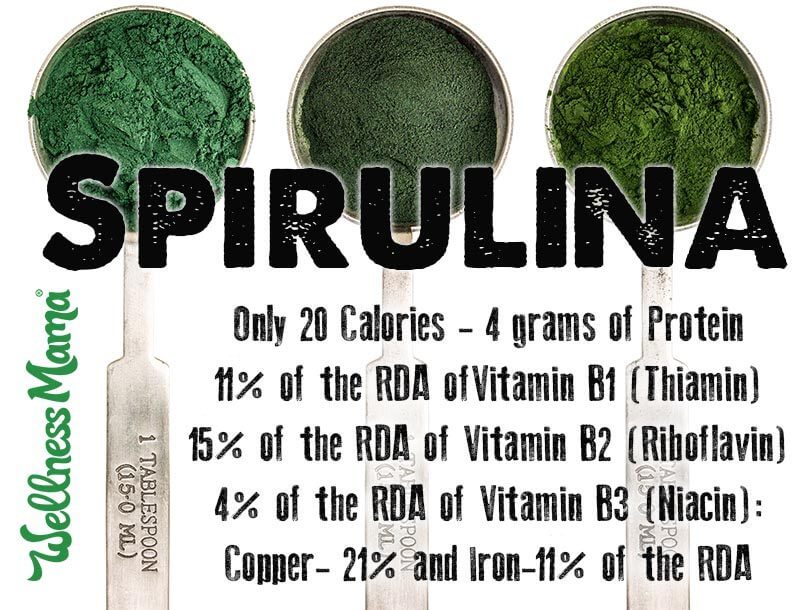
Spirulina is a great source of other nutrients including (according to Wikipedia): “It contains vitamins B-1(thiamine), B-2 (riboflavin), B-3(nicotinamide), B-6 (pyridoxine), B-9 (folic acid), vitamin C, vitamin D, vitamin A and vitamin E. It is also a source of potassium, calcium, chromium, copper, iron, magnesium, manganese, phosphorus, selenium, sodium and zinc. Spirulina contains many pigments which may be beneficial and bioavailable”.
Important Note: Contrary to many claims, Spirulina is not a good source of Vitamin B12 for humans. While it does contain a form of B12, it is pseudovitamin B12 which is not absorbable or effective in humans according to studies.
2. Contains Gamma Linolenic Acid (GLA) & Omega-3s
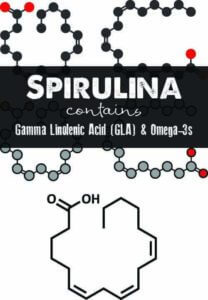
Spirulina is 65% protein and amino acids including the essential fatty acid gamma linolenic acid (GLA) which has gotten a lot of attention for its anti-inflammatory properties, especially when taken with other quality Omega-3 supplements.
GLA is difficult to find in a food source and normally has to be created by the body. Spirulina is one of the few foods with a natural GLA content.
I suspect that the benefits of GLA in Spirulina are even more than what the studies have found since these studies often use vegetable oils for their GLA source, and the other inflammatory compounds in vegetable oils can interfere with the anti-inflammatory ability.
Besides GLA, Spirulina also contains Omega 3-,6 and 9s and is especially high in Omega-3s.
3. May Help Balance Blood Sugar
Studies show that spirulina may be especially helpful in balancing blood sugar, and may even be as effective as diabetes medication in some instances. Other studies show that it not only lowers blood sugar but may also lower HbA1c, which is a long term marker of blood sugar levels.
4. Powerful Antioxidants
Antioxidants are powerful substances that protect our cells from damage. Thanks to decades of research, many of us understand the importance of consuming enough antioxidants from natural sources, and spirulina is a great choice.
The antioxidant that makes spirulina unique is called phycocyanin, which is a potent anti-inflammatory.
5. May Help Those with Allergies
Some research has suggested that Spirulina may be helpful for those with allergies and allergic reactions. (source)
This is likely because it reduces inflammation that leads to nasal congestion and other issues. In studies, those who took spirulina noticed a reduction in nasal congestion, itching, and sneezing.
6. Helps Remove Heavy Metals
Spirulina can bind with heavy metals in the body and help remove them.
It is also extremely high in Chlorophyll, which helps remove toxins from the blood and boost the immune system. In fact, one study found that 500 milligrams of spirulina daily combined with zinc supplementation was enough to reduce arsenic toxicity by almost half!
Emerging evidence also suggests that it binds with radioactive isotopes and may be useful for radioactivity exposure or radiation therapy.
7. Muscle and Endurance Benefits
Spirulina is known to increase fat burning during exercise. Its high antioxidant content makes it beneficial in reducing exercise induced oxidation which leads to muscle fatigue and inability to gain muscle.
In fact studies found that it:
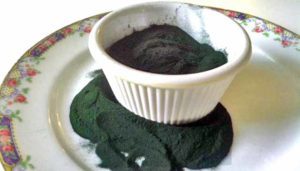
Cautions on Spirulina
Those with phenylketonuria (PKU) should consult with a doctor before taking, as it does contain that amino acid. Those on any type of anti-coagulation medicine should consult with a doctor before beginning (or stopping) taking Spirulina. Some people with autoimmune disease do not do well with this supplement. If you are pregnant, nursing or have any medical condition, check with your doctor first as it is often not recommended for pregnant or nursing women.
Downsides of Spirulina
As I mentioned above, this beneficial algae is gram for gram one of the most nutritious foods on the planet. It is also probably one of the most expensive when compared gram for gram. Many articles about its benefits focus show the nutrition data per ounce. The problem is that one ounce contains about 28 grams and is MUCH higher than normal (or safe) daily intake would be.
It costs up to 30x as much as dairy or meat protein per gram and is not a viable primary protein source for this reason.
Is Spirulina the Same as Chlorella?
Short answer: No, but they share some similarities.
Both are types of algae but there are some key differences:
- Structure: Chlorella is a single-cell algae with a nucleus, while Spirulina is a multi-celled plant with no nucleus. For this reason, chlorella is much smaller and acts differently in the body.
- Color: Spirulina is a cyanobacteria, a blue-green type of algae, while Chlorella is a green algae.
- Amount of Nucleic Acids: Both are a good source of nucleic acids, though Chlorella has almost twice as much per gram. Nucleic acids are important factors for DNA and RNA in the body.
- Digestibility: Chlorella has to go through a process to break its cell walls before it is bioavailable and usable by the body.
- Chlorophyll Content: Chlorella is higher in Chlorophyll, with almost double the amount.
- Iron, Protein and GLA: Chlorella is not a great source of Iron, protein and beneficial Gamma-Linolenic Acid (GLA).
- Heavy Metals: Chlorella has unique properties in its cell walls that make it bind to heavy metals and other contaminants
How to Take Spirulina (& What I Use)
I use a couple of different sources of spirulina that all checked out when I did my research.
- Spirulina Powder – The least expensive but has a a strong flavor
- Spirulina Capsule – Small, portable tablets called “EnergyBits.” Very easy to take and no unpleasant taste. Use the code “wellnessmama” at this link for 20% off.
For more on why spirulina and chorella are so beneficial for health, check out this Wellness Mama podcast interview with EnergyBits creator Catharine Arnston.
This article was medically reviewed by Dr. Scott Soerries, MD, Family Physician and Medical Director of SteadyMD. As always, this is not personal medical advice and we recommend that you talk with your doctor.
Ever tried spirulina? What did you think of the taste? Will you try it now? Share below!
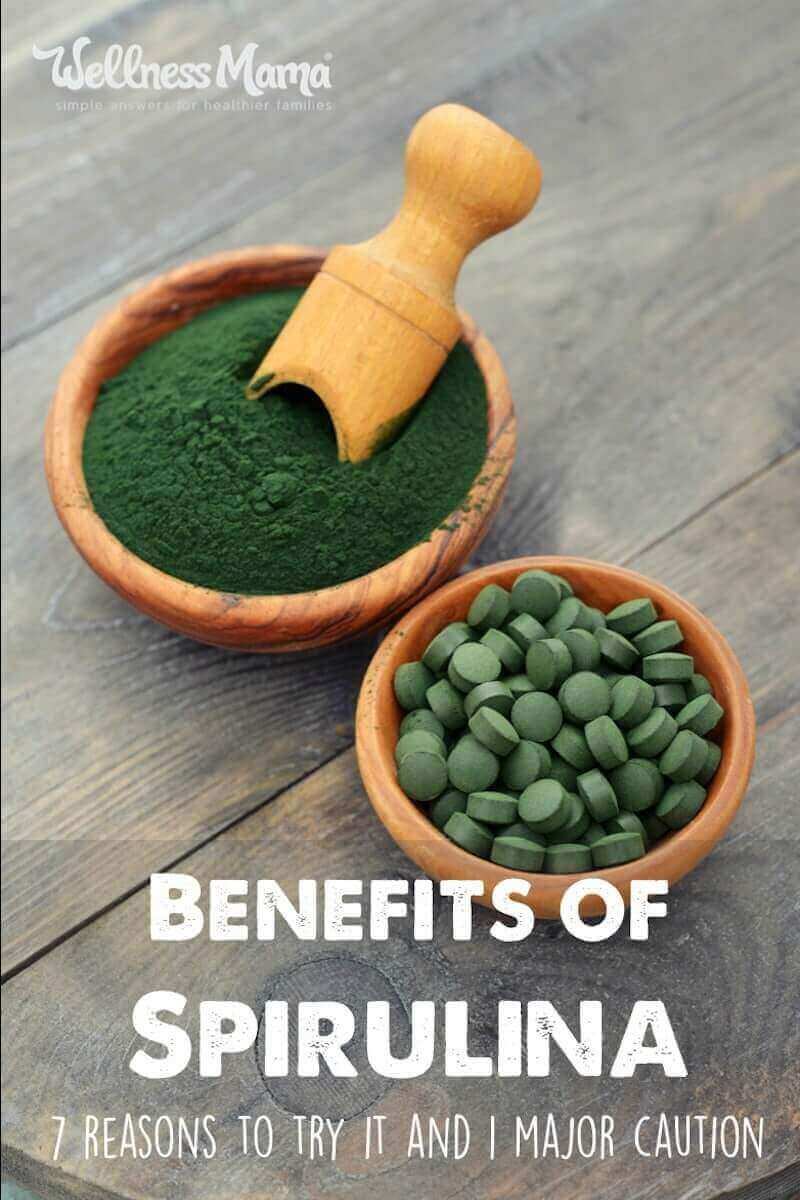

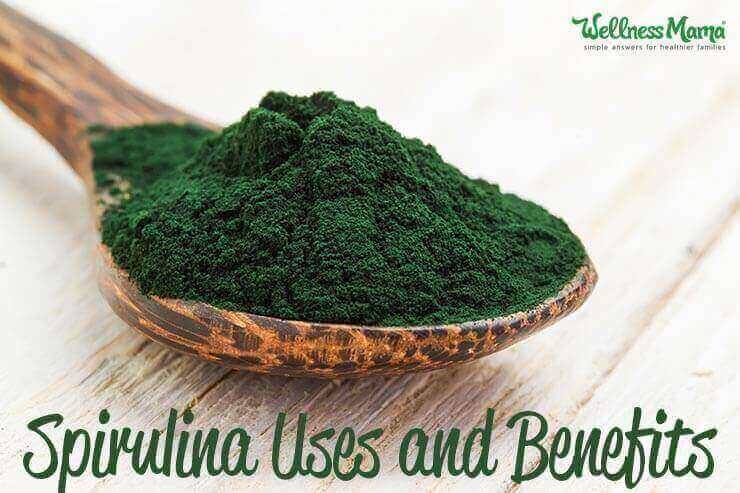
Leave a Reply